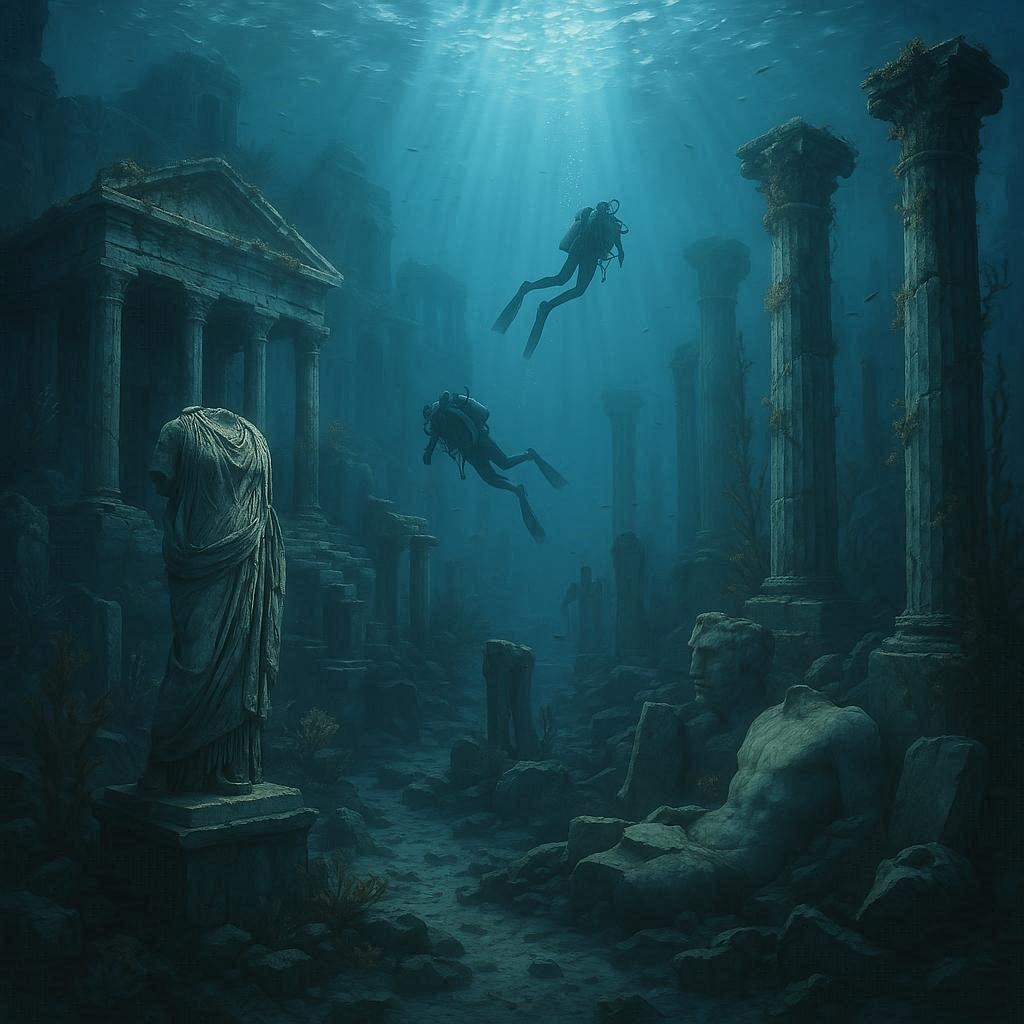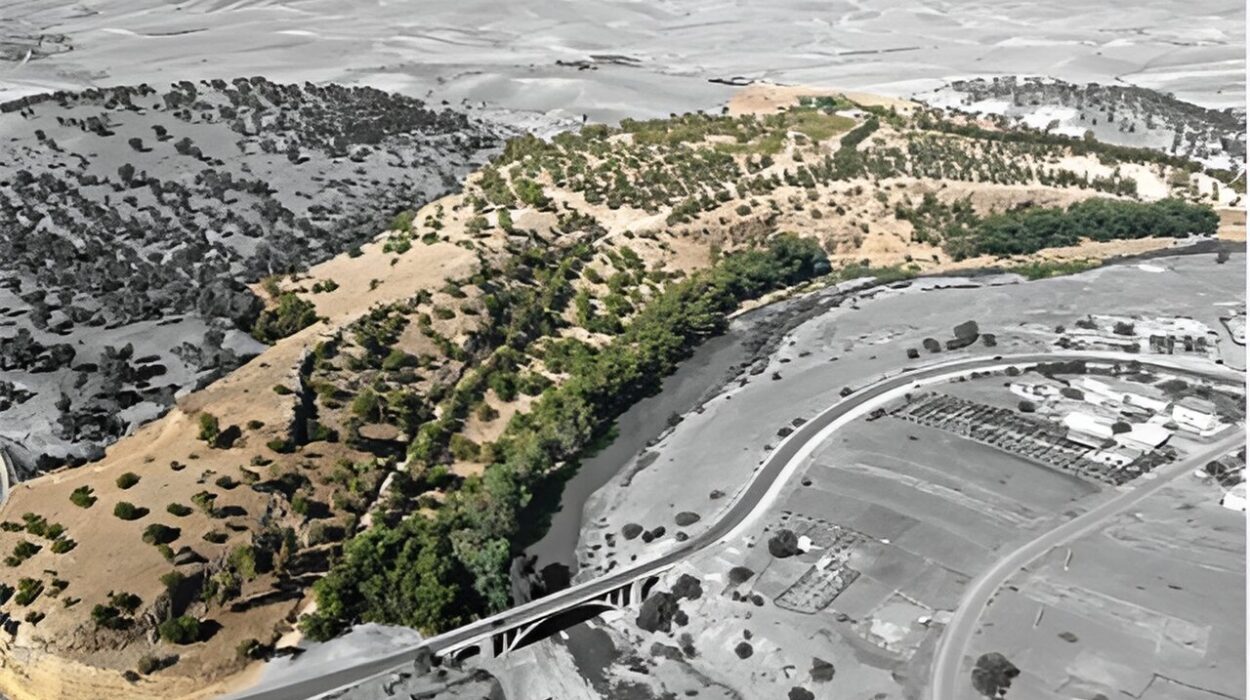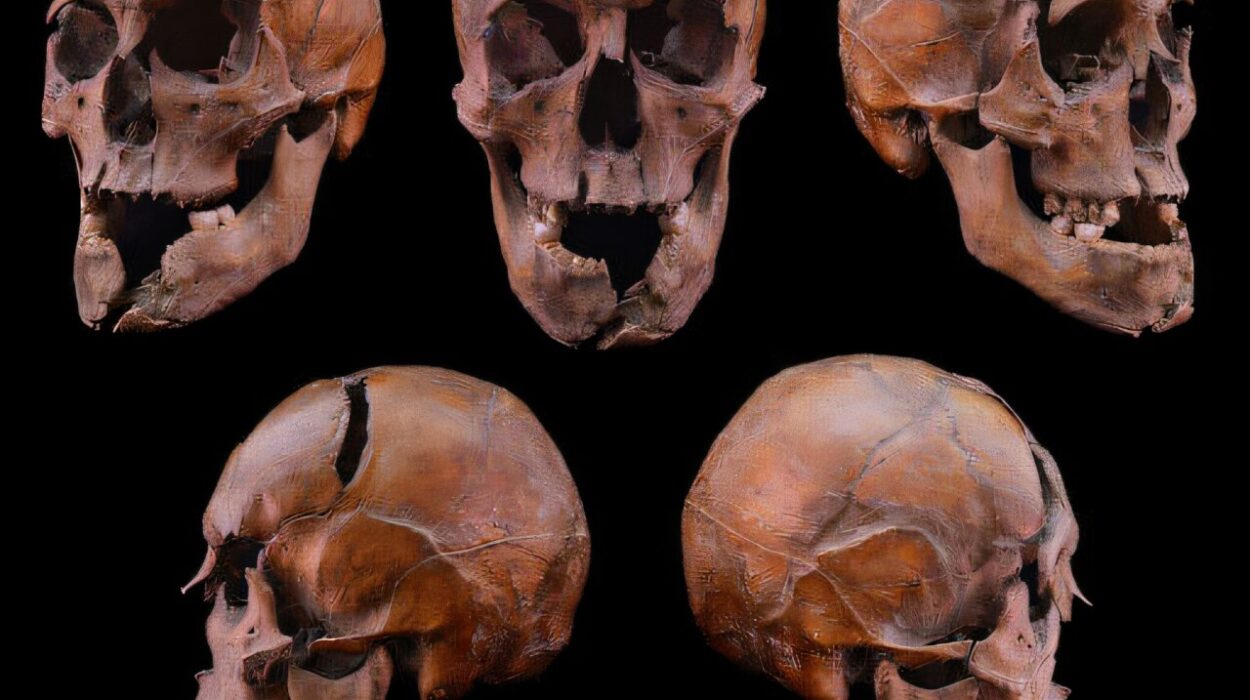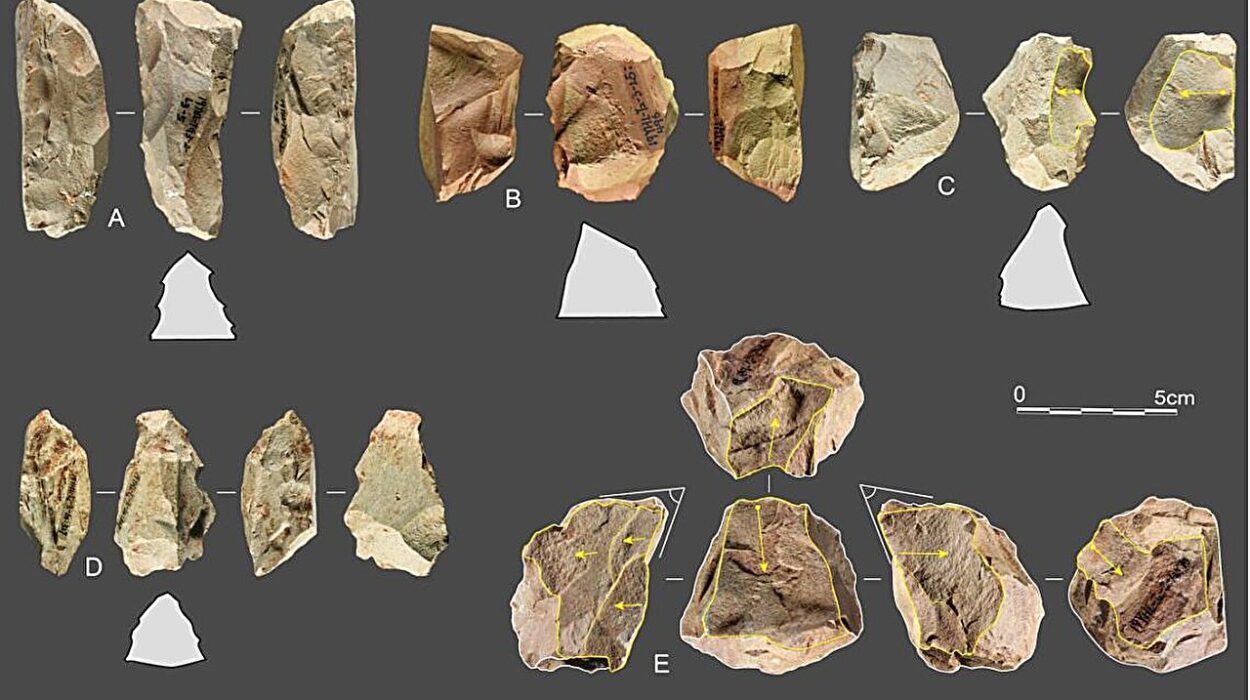Few legends have captivated human imagination as powerfully as the story of Atlantis. A great island kingdom, advanced in wealth, knowledge, and power, suddenly swallowed by the sea in a single day and night—this is the image that has haunted storytellers, explorers, philosophers, and archaeologists for more than two millennia. Atlantis is not merely a tale of catastrophe. It is the embodiment of a dream, a warning, and a question that has never found a definitive answer: was Atlantis real, and if so, where is it now?
The mystery of Atlantis lies at the intersection of myth and science. While archaeologists seek evidence grounded in the earth and sea, the legend continues to inspire speculation that stretches beyond what is visible, into realms of fantasy and possibility. Unlike many myths, the story of Atlantis has endured not only because of its dramatic imagery but because it carries themes that resonate deeply with humanity—hubris, downfall, and the fragility of even the greatest civilizations.
The First Telling: Plato and the Birth of a Legend
All serious discussions of Atlantis begin with one source: the Greek philosopher Plato. Around 360 BCE, in his dialogues Timaeus and Critias, Plato recounts a tale passed down, he claims, from earlier Egyptian records. According to him, Atlantis was a vast island located “beyond the Pillars of Heracles” (what we now call the Strait of Gibraltar), larger than Libya and Asia Minor combined. It was said to be a powerful, technologically advanced kingdom that had existed 9,000 years before his own time.
Plato described Atlantis as a marvel of urban planning, with concentric rings of land and water, bridges, canals, and grand temples. Its people were said to be descendants of the sea god Poseidon and a mortal woman, which gave them both divine power and human ambition. Over time, however, the Atlanteans grew greedy and corrupt. Their armies attempted to conquer the known world, but were defeated by the Athenians. Soon after, divine punishment struck. In a cataclysm of earthquakes and floods, Atlantis sank beneath the sea, vanishing forever.
For Plato, Atlantis was not only a story about a lost world. It was a moral allegory about the dangers of arrogance and the inevitability of decline. Like many of his philosophical parables, the tale was meant to instruct, not necessarily to describe history. Yet the vividness of his account—the detailed geography, the grandeur of the culture, the drama of its end—has convinced generations that Plato was reporting a memory of something real.
The Debate: Fact, Fiction, or Philosophy?
The question of Atlantis’s reality has long divided scholars. Some argue that Plato invented it entirely as a cautionary fable, much as he created the ideal Republic in his dialogues. Others suggest that his story was inspired by real events, distorted over centuries of oral tradition. Still others believe it may have been based on actual places that were misinterpreted or mythologized.
One theory points to the eruption of Thera (modern-day Santorini) around 1600 BCE, one of the largest volcanic eruptions in human history. This disaster devastated the advanced Minoan civilization on Crete and surrounding islands. Some scholars see echoes of this event in Plato’s description of a great island swallowed by the sea. Others have proposed links to Troy, Tartessos in Spain, or even the Americas.
Archaeologists tread carefully. Without physical evidence, Atlantis cannot be classified as a historical civilization. Yet archaeology provides context: we know that ancient peoples witnessed and recorded cataclysmic events, such as floods, earthquakes, and eruptions. The legend of Atlantis could well be a memory of such real disasters, reframed through myth.
The Minoan Connection: Echoes of a Real Catastrophe
Of all the hypotheses, the connection between Atlantis and the Minoans is the most compelling in archaeological terms. The Minoan civilization, flourishing from about 3000 to 1450 BCE, was one of the most advanced of its time. Based on Crete and surrounding islands, the Minoans built palaces with sophisticated plumbing, vibrant frescoes, and thriving trade networks that stretched across the Mediterranean.
Then came the eruption of Thera. The volcanic explosion sent ash across the region, produced tsunamis, and destabilized the Minoan economy. Although the civilization did not vanish immediately, its decline followed soon after, leaving ruins that puzzled later generations. To Greek storytellers centuries later, the memory of a powerful island civilization destroyed by the sea could have merged into the tale of Atlantis.
Excavations at Akrotiri, a Minoan city buried under volcanic ash, reveal a haunting picture. Streets, houses, and frescoes remain preserved in extraordinary detail, much like Pompeii. To walk among these ruins is to glimpse a society frozen in time, suddenly undone by natural catastrophe. For many archaeologists, Akrotiri is the closest we may ever come to seeing Atlantis in the flesh.
Atlantis Beyond the Mediterranean
Yet not all agree that Atlantis was the Minoans. The allure of Plato’s description—an island larger than Libya and Asia Minor—has fueled theories that stretch across the globe. Some have placed Atlantis in Spain, pointing to Tartessos, an ancient seafaring culture in Andalusia that mysteriously disappeared. Others suggest it was in the Azores, the Caribbean, or even Antarctica, buried under ice. In the 19th and early 20th centuries, some writers linked Atlantis to theories of lost continents, imagining it as the origin of civilizations in Egypt, Mesopotamia, and the Americas.
Mainstream archaeology rejects such far-flung claims, as they lack evidence and often reflect colonial-era fantasies of “lost races” teaching knowledge to ancient peoples. Yet the persistence of these ideas shows the symbolic power of Atlantis. It is not just a place but a canvas onto which people project their own hopes, fears, and curiosities.
Atlantis in Myth and Memory
The story of Atlantis also resonates with older myths of floods and sunken lands. Nearly every culture has a flood story, from the Mesopotamian Epic of Gilgamesh to the biblical Noah, from Hindu traditions of Manu to Native American legends of drowned worlds. Archaeology shows that rising seas at the end of the last Ice Age, around 12,000 years ago, did indeed submerge vast coastal areas. It is possible that memories of these ancient inundations lingered in collective memory, reshaped into myths like Atlantis.
In Celtic tradition, there are tales of Ys, a city swallowed by the sea. In Indian lore, the city of Dwarka, associated with the god Krishna, is said to have sunk beneath the waves. Archaeological explorations off India’s coast have uncovered submerged ruins that fuel these connections. In this broader context, Atlantis is one among many stories humanity tells about the sea’s power to give and take civilizations.
The Allure of the Unsolved
Why does Atlantis continue to fascinate when so many other ancient mysteries fade into obscurity? Part of the answer lies in its duality: Atlantis is both a cautionary tale and a dream of perfection. It represents humanity at its height—wealthy, advanced, magnificent—and humanity at its most vulnerable, destroyed in an instant. It is a mirror of our own anxieties, reminding us that greatness is fragile.
Atlantis also embodies the universal human yearning for discovery. The idea that a lost world might still lie hidden beneath the ocean’s depths is irresistible. Even in an age of satellites and global maps, the deep sea remains largely unexplored. Atlantis endures because it offers a tantalizing possibility: that history still holds secrets of unimaginable scale, waiting to be uncovered.
Archaeology’s Response: Between Caution and Wonder
Archaeologists approach Atlantis with caution, because extraordinary claims demand extraordinary evidence. No excavation has produced artifacts that can be directly tied to Plato’s description. The seabed beyond the Strait of Gibraltar, often proposed as a location, has yielded no traces of sunken continents. Satellite mapping of the ocean floor shows no landmass of the scale Plato described.
Yet archaeology does not dismiss Atlantis entirely. Instead, it reframes the question. Rather than seeking a literal sunken continent, scholars look at the broader pattern of myths, disasters, and cultural memories. The story of Atlantis becomes not a map to a hidden island but a window into how ancient peoples made sense of catastrophe. By studying the Minoans, the eruption of Thera, and the flood myths of many cultures, archaeology reveals the real foundations of such legends.
Modern Discoveries and the Search for Atlantis
Despite scholarly caution, the search for Atlantis continues, often fueled by new technology. Sonar mapping, underwater drones, and satellite imagery have all been employed in the hunt. Occasionally, discoveries spark excitement: submerged structures off the coast of Cuba, ruins near the Bahamas, or geometric patterns on the seafloor that turn out to be natural formations. While none have proven to be Atlantis, they remind us that the ocean still conceals countless mysteries.
The discovery of submerged prehistoric settlements, such as Doggerland in the North Sea, also shows that the sea has indeed swallowed human worlds. These finds do not prove Atlantis, but they demonstrate that Plato’s vision of a drowned land is not implausible in principle. Archaeology continues to reveal that the boundaries between land and sea have shifted dramatically throughout human history.
Atlantis as a Mirror for Our Time
Beyond the question of its reality, Atlantis speaks directly to the modern world. It is a story of environmental disaster and human hubris, themes that resonate strongly today. The image of a powerful civilization brought low by natural forces echoes our own concerns about climate change, rising seas, and ecological collapse. In this sense, Atlantis is not only about the past but also about the future we fear.
Archaeology shows us that civilizations are vulnerable. From the Maya to Mesopotamia, from the Indus Valley to Easter Island, societies have risen and fallen under pressures of environment, politics, and culture. Atlantis, whether real or allegorical, reminds us that no civilization is immune to collapse. Its enduring power lies in its ability to warn us while captivating us.
The Endless Puzzle
In the end, the mystery of Atlantis may never be solved. Perhaps it was entirely Plato’s invention, a philosophical fable that grew into legend. Perhaps it was inspired by real events, filtered through centuries of storytelling. Perhaps, hidden beneath the ocean, there are still ruins waiting to be found.
What is certain is that Atlantis has become more than a lost island. It is an idea, a story that transcends time, culture, and geography. Archaeology can test, question, and contextualize the legend, but part of its magic lies in what cannot be proven. The mystery itself is the treasure, a reminder that even in an age of science, wonder endures.
Atlantis is archaeology’s greatest unsolved puzzle not because we cannot find it, but because it occupies a space where myth and reality blur. It challenges us to ask not only what happened long ago, but why we continue to dream of it today. And as long as humans are drawn to stories of lost worlds and hidden truths, Atlantis will never sink entirely into the past—it will remain alive in our imagination, waiting to be rediscovered again and again.






